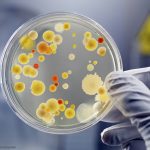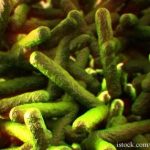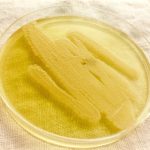Columbus State University Biology Majors have published a paper about their research on treating antibiotic resistant bacteria. The students were focusing on alternative therapies to treat Acinetobacter haumannii, which causes urinary tract infections, pneumonia, burns and wound infections, and septicemia. The World Health Organization has said that antibiotic resistant bacteria is a major public health concern and may cause millions of deaths in the future because of untreatable common infections. And in 2016, the CDC found that antibiotic resistant Salmonella causes more than 6,000 illnesses in this country every year. Those types of infections are linked to beef, dairy, poultry, produce, and eggs. The paper, titled "The Effects of Antimicrobial Peptides WAM-1 and LL-37 on … [Read more...]
Columbus State University Students Publish Breakthrough Study on Treating Antibiotic Resistant Bacteria
E. coli Bacteria Infections: Bacteria Produce Toxin Protein to Defend Themselves
E. coli bacteria produce a toxin protein to defend themselves and kill off other bacteria, according to new research published in the journal Nucleic Acids Research. There have been many E. coli bacteria outbreaks in the United States in the past several years, including the deadly outbreak linked to I.M. Healthy SoyNut Butter earlier this year and the current outbreak at Damsy Restaurant in Rochester, Minnesota. And last year, researchers discovered a strain of E. coli bacteria that had the mcr-1 gene for colistin resistance. This is bad news because that change gives the pathogenic bacteria "near pan-resistance to last-resort antibiotics," according to the study summary. Scientists study this bacteria to see how it manages to survive even in inhospitable conditions. These … [Read more...]
New Insights on How Pathogens Escape Immune System
A new study at the University of Cologne is trying to decode how the pathogen Salmonella enterica escapes the immune system. And they found a mechanism the bacteria uses. There were 13,822 reported cases of Salmonella typhimurium in Germany in 2015. In healthy people, most recover without any treatment from antibiotics, but those who are considered "high risk" can suffer serious illness and even death. Those patients include the elderly, the very young, pregnant women, people with chronic illnesses such as diabetes, and those with immune deficiencies. In those high risk patients, the bacteria cause damage to cells and can get into the bloodstream. If this happens, an infection called "sepsis" occurs, which can be life-threatening. Salmonella bacteria escape a process called … [Read more...]
Researchers Find One Mechanism for Antibiotic Resistance
A study conducted at Harvard and MIT and published in the journal eLife has discovered one way that bacteria become resistant to drugs. Individual mutations that increase pathogenic bacteria's resistance to multiple antibiotics has not been fully explored. About 23,000 Americans die every year from bacterial and fungal infections that are resistant to antibiotics. That number is expected to increase to 10,000,000 by the year 2050 if new, effective antibiotics are not developed. Scientist cultured the bacteria Mycobacterium smegmatis, a cousin of the bacteria that causes tuberculosis. The scientists grew the bacteria until they formed colonies, and then exposed the colonies to low doses of antibiotics that killed the bacteria slowly. Mutant colonies arose after that … [Read more...]
UK Experts Urge Shoppers to Wash Hands After Handling Chicken Packages
We all know that raw chicken can contain pathogenic bacteria such as Campylobacter and Salmonella. But experts were more concerned with the bacteria on the inside of the basic plastic supermarket wrapping. Now experts in the UK are warning shoppers to wash their hands after handling these packages, since the bacteria could also be on the outside. An investigation by the Daily Telegraph found that the plastic exterior of more than 1 in every 100 raw chickens sold in Britain may have a potentially infectious level of Campylobacter bacteria. That means that 9,000,000 packages of chicken are sold with a "dangerous dose of deadly bacteria on the outside." When a shopper picks up a package of chicken, then snacks on food while shopping, they could get sick. Campylobacter is the leading … [Read more...]
Cornell Develops Processor to Destroy Pathogens in Food
Cornell food scientists have developed a new high pressure food processor to destroy food pathogens. This is the nation's first commercial scale validation facility for a technology that kills bacteria and extends the shelf life of fresh, ready to eat foods. It can be used on juice, baby foods, meats, and salads. The device is a Hiperbaric 55 high-pressure food processor at Cornell's New York State Agricultural Experiment Station. It works by surrounding completed ready to eat foods in their packages with water. The machine applies isostatic pressure up to 87,000 pounds per square inch. According to Cornell, "that's more than six times the pressure at the bottom of the Mariana Trench, the deepest ocean trench on Earth." More and more consumers want fresh, packaged, ready to eat … [Read more...]
Research Finds Salmonella Food Poisoning Could Damage DNA
Research at Cornell University has found that Salmonella food poisoning caused by some serotypes of the pathogenic bacteria could permanently damage your DNA. The study is published in the journal mBio by the American Society for Microbiology as "The Cytolethal Distending Toxin Produced by Nontyphoidal Salmonella Serotypes Javiana, Montevideo, Oranienburg, and Mississippi Induces DNA Damage in a Manner Similar to That of Serotype Typhi." Dr. Rachel Miller, author of the study, said, "not all Salmonella serotypes are equal." There are more than 2,500 serotypes for Salmonella, but fewer than 100 of those cause most of the food poisoning cases in this country, according to the CDC. Salmonella causes about 1.2 million illnesses every year in the U.S., and kills about 450 … [Read more...]
Scientists Kill Antibiotic Resistant Bacteria with Brute Force
New research at University College London (UCL) has found that antibiotics can kill antibiotic-resistant bacteria with brute force. The study was published in Nature Scientific Reports. In order to kill bacteria, antibiotics have to bind to the cells in the pathogens. Bacterial resistance can be caused by molecular changes to the surface of the bacteria. Dr. Joseph Ndieyira of UCL Medicine said, "Antibiotics have 'keys' that fit 'locks' on bacterial cell surfaces, allowing them to latch on. When a bacterium becomes resistant to a drug, it effectively changes the locks so the key won't fit any more. Incredibly, we found that certain antibiotics can still 'force' the lock, allowing them to bind to and kill resistant bacteria because they are able to push hard enough. In fact, some … [Read more...]












